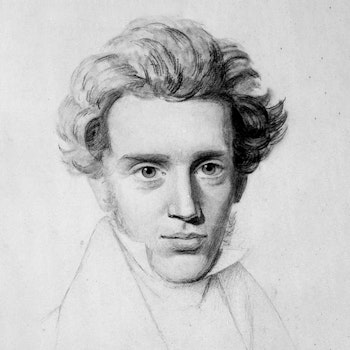“Why I so much prefer autumn to spring is that in the autumn one looks at heaven—in the spring at the earth.”—Søren Kierkegaard
The father of existentialism, Søren Kierkegaard (1813-1855) was a philosopher who could write like an angel. With only a sentence or two, he could plumb the depths of the human spirit. In this collection of some 800 quotations, the reader will find dazzling bon mots next to words of life-changing power. Drawing from the authoritative Princeton editions of Kierkegaard’s writings, this book presents a broad selection of his wit and wisdom, as well as a stimulating introduction to his life and work.
Organized by topic, this volume covers notable Kierkegaardian concerns such as anxiety, despair, existence, irony, and the absurd, but also erotic love, the press, busyness, and the comic. Here readers will encounter both well-known quotations (“Life must be understood backward. But then one forgets the other principle, that it must be lived forward”) and obscure ones (“Beware false prophets who come to you in wolves’ clothing but inwardly are sheep—i.e., the phrasemongers”). Those who spend time in these pages will discover the writer who said, “my grief is my castle,” but who also taught that “the best defense against hypocrisy is love.”
Illuminating and delightful, this engaging book also provides a substantial portrait of one of the most influential of modern thinkers.
- Gathers some 800 quotations
- Drawn from the authoritative Princeton editions of Kierkegaard’s writings
- Includes an introduction, a brief account and timeline of Kierkegaard’s life, a guide to further reading, and an index
Awards and Recognition
- One of The Wall Street Journal Bookshelf Best Books of 2013, chosen by Mike Tyson
Søren Kierkegaard (1813–1855) was a Danish philosopher, theologian, and writer who is often considered the father of existentialism. His best-known books include Either/Or, Fear and Trembling, The Sickness Unto Death, and The Concept of Anxiety. Gordon Marino is professor of philosophy at St. Olaf College. His books include The Existentialist’s Survival Guide and Kierkegaard in the Present Age.
"Marino's offers a collection that touches all of Kierkegaard's obsessions, from anxiety and depression to time and eternity and existence and God and Christ and love. The book is, as Marino hoped, full of arresting one-liners. . . . Beyond the aphorisms are penetrating arguments wound tightly into brief paragraphs."—Peter Leithart, First Things
"[Marino] has done a great service to neophyte and seasoned Kierkegaard scholars with this compendium of the wit and wisdom of the Danish philosopher often dubbed the father of existentialism. Just as valuable as the quotes are Marino's introduction to Kierkegaard's thought and account of his life."—Christian Century
"This handily compact treasury of assorted thoughts, observations, and insights bursts with Kierkegaard's characteristically infectious urgency, wit, and lapidary penetration. The volume gathers some 800 thematically organized passages—generally no longer than a few sentences—drawn from the sweeping range of this influential 19th-century Danish existentialist philosopher and theologian's published discourses, polemical tracts, books, pseudonymous works, journals, and notebooks."—Choice
"The Quotable Kierkegaard serves equally well as an introduction or a reference book. There is no better way to sample the unique flavor of Kierkegaard's thought. And if you ever need a quotation for a speech or a sermon, for an epigraph or an epitaph, for a dedication or a denunciation, you're sure to find a striking one here."—David Lodge, author of Small World, Therapy, and other novels
"[A] collection of awesome quotes from that great Danish philosopher."—Mike Tyson
"This book is the best of two worlds: a rich collection of quotations from Kierkegaard that also provides a quick introduction to the central core of his thinking."—Alastair Hannay, author of Kierkegaard: A Biography
"This admirable selection of quotations from the eminently quotable Kierkegaard is a fine introduction to the breadth and variety of his thought."—Bruce H. Kirmmse, general editor of Kierkegaard's Journals and Notebooks


